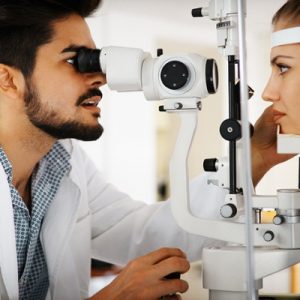If you have been told you are not suitable for regular contact lenses – scleral lenses may the the solution you have been seeking.
Scleral lenses are the best option when you want to wear contact lenses, but neither soft or regular hard lenses are suitable.
What are scleral lenses?
Scleral lenses are a type of gas permeable (GP) lens that are specially designed for patients with corneal irregularities and other eye conditions that make contact lens wear difficult.
Their unique design enables them to arch over the cornea and sit on the sclera, or the white part of the eye.
Scleral lenses are larger than standard GP lenses, and are therefore more stable on the eye. Their increased stability enhances comfort and makes them less likely to move around or fall out when you least expect it.
Types of scleral lenses
Scleral lenses are available in three different options:
- Corneo-scleral lenses and semi-scleral lenses are the smallest of the scleral lenses, and are positioned on the eye where the cornea and sclera meet.
- Mini-scleral lenses are the mid-sized scleral lenses. They arch over the cornea and are positioned on the front part of the sclera.
- Full scleral lenses are the biggest scleral lens option and provide the largest arch over the cornea, increasing the space between the lens and the cornea.
When are scleral lenses prescribed?
Although anyone can benefit from scleral lenses, they are generally prescribed for patients diagnosed with:
- Irregular corneal shape
- Sensitive cornea
- Corneal conditions
- Keratoconus
- Pellucid marginal degeneration
- Post-penetrating keratoplasty (PKP)
- Corneal irregularities post refractive surgery
- Moderate to high astigmatism
- Sensitive eyes
- “Hard-to-fit” eyes
- Severe dry eye syndrome
Scleral lenses are custom designed for each patient to provide increased comfort, along with clearer, sharper vision.
If you have told you cannot wear soft contact lenses, contact an eye doctor near you, to discuss whether scleral lenses might be the solution.
SEE RELATED: How to Insert and Remove Scleral Lenses
Scleral lenses and dry eye syndrome
Scleral lenses may be a solution for patients who have been told to avoid contact lenses due to their severe dry eye condition.
Standard contact lenses sit directly on the cornea and can therefore cause discomfort and irritation, and even increase the risk of corneal injury.
Scleral lenses do not touch the cornea at all, and are designed to keep the eye hydrated throughout the day.
Prior to scleral lens insertion, fresh saline solution is applied to the “bowl” of the lens. The solution remains in the space between the lens and cornea to provide continuous hydration and dry eye relief.
Some eye doctors recommend adding a gel eye drop or artificial tears solution to the “bowl” of the lens for further dry eye relief.
Artificial tears and other lubricating eye drops prescribed by your doctor may also be used during scleral contact lens wear to further lubricate your eyes. However, many patients discover that they are able to reduce the frequency of these drops as they begin to wear their scleral lenses.
As a result of the constant hydration provided by the scleral lens, patients with normally red, irritated dry eyes can obtain healthier looking eyes.
Scleral lenses are a great option for patients with dry eye syndrome, providing dry eye relief, improved visual acuity, and improved quality of life.
What are the benefits of scleral lenses?
There are many benefits to wearing scleral lenses, including:
- Customized to your needs
- Higher oxygen permeability
- Durable and scratch resistant
- Comfortable, without any adaptation period
- Provide clear, sharp vision
- Stable on the eye
- Correct vision for hard to fit ocular conditions
- Provide dry eye relief
- Easy care and handling
What are the disadvantages of scleral lenses?
In order to obtain accurate eye measurements and a precise optical prescription, a scleral lens exam involves the use of special imaging devices and automated instruments. As a result, a scleral lens exam may be more expensive than a regular contact lens exam.
Additionally, scleral lenses should last around one to three years, but if you need to replace your scleral lenses for any reason, the cost of replacement lenses will typically be higher than standard contact lenses.
LEARN MORE: Optical and Contact Lenses
If you are interested in learning more about scleral lenses and if they are right for you, schedule an appointment with an eye doctor near you.
Scleral lenses are a great contact lens option for those with special eye conditions, and may provide the comfort and visual clarity you have been searching for.









